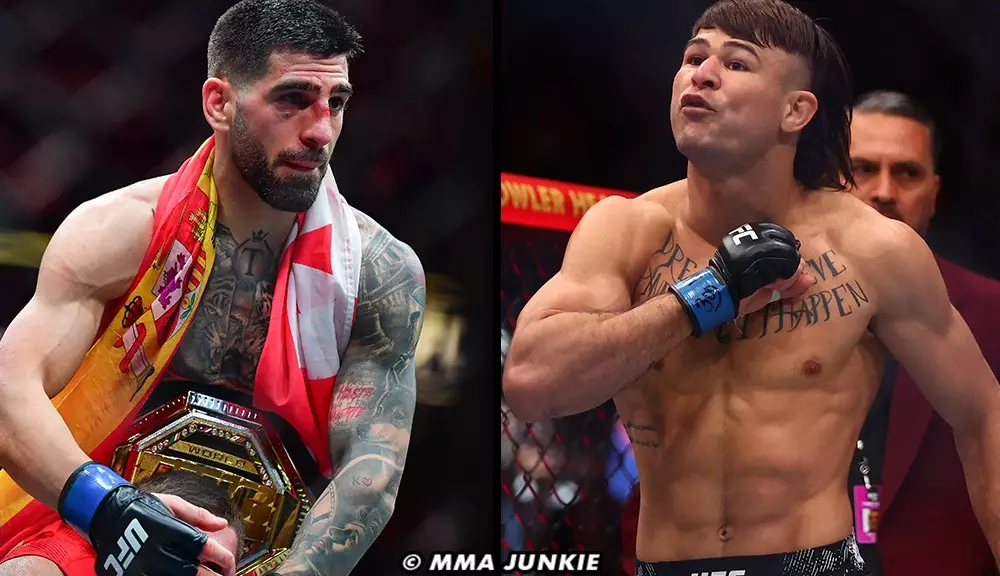The landscape of mixed martial arts (MMA) is ever-evolving, with fighters, titles, and divisions constantly shifting in significance. Recently, UFC CEO Dana White hinted at a substantial change in the organizational approach to title fights, particularly concerning champion-vs.-champion matchups. This newfound policy appears to be influencing the careers of fighters significantly, as illustrated by the recent decision of Ilia Topuria to vacate his featherweight title. Diego Lopes has provided insight into this situation, stating that the UFC is discouraging champions from moving between weight classes while holding belts.
Ilia Topuria’s announcement to vacate the featherweight title has drawn attention throughout the MMA community. The talented fighter, who holds an unblemished record and is regarded as one of the top competitors in the featherweight division, has expressed aspirations of moving to lightweight to challenge current champion Islam Makhachev. However, Lopes insists that in order to pursue this goal, Topuria had to relinquish his title. This reflects a strategic pivot by the UFC, emphasizing a more rigid stance on the movement between weight classes for champions.
Topuria’s aspiration to enter a new weight class is not uncommon in combat sports, where athletes frequently seek challenges against the best fighters in higher divisions. However, what makes the UFC’s stance noteworthy is its unexpected opposition to champion status being split across classes. It appears that the organization is keen to maintain distinct divisions without the complications that dual champions might introduce.
Shifting Dynamics: The UFC’s Historical Context
Exploring the UFC’s historical approach to champion-vs.-champion fights reveals a rarity in such matchups. Over the retrospective three-decade history of the organization, only a handful of these bouts have taken place. The challenge of booking these fights lies in the inherent risks: fighters may drain themselves or experience outcomes that could diminish the allure of both divisions involved. As observed with the dual champions, like Amanda Nunes and Conor McGregor, maintaining visibility and relevance in multiple divisions has proven to be a complex endeavor.
Lopes cites this limited history as part of the rationale for Topuria’s decision. He resonates with the notion that fighters should focus on refining their skills and competing within their current division before chasing the fleeting allure of multi-division titles. In many instances, champions who leap between classes do not retain the same standing due to the lack of defended titles or lack of engagement with contenders in their original division.
Lopes’s Perspective: A Fighter’s Insight
Diego Lopes’s remarks provide a nuanced perspective on the circumstances surrounding Topuria’s choice. Although he would have preferred to see Topuria remain steadfast in the feisty featherweight division and contend against its rising challengers, Lopes acknowledges that fighters ultimately must make choices that align with their aspirations and career trajectories. His understanding of Topuria’s motivation underscores the broader reality that fighters are not only athletes but individuals navigating their careers toward personal and professional fulfillment.
Lopes maintains that the featherweight division is still rich with formidable opponents capable of providing intense competition. He emphasizes the importance of showcasing the depth and talent existing among contenders, despite Topuria’s recognition of having defeated legendary figures, such as Max Holloway and Alexander Volkanovski, in the division.
The UFC’s decision to dissuade champions from moving up in weight presents implications for future fighters. The message is clear: if fighters are ambitious about ascending to a higher weight class, they must be prepared to vacate any current titles. This policy could affect up-and-coming prospects who may need to reassess their career strategies.
As the landscape continues to shift, fighters must increasingly weigh the pros and cons of remaining in their division versus pursuing elevated challenges. For many, the allure of competing for more prestigious titles will have to be balanced against the potential loss of current championship status. The ramifications of this strategy could resound through the organization, as fighters and fans alike adapt to a new normal in the commonly revered world of UFC title pursuits.
The sport faces a turning point. As the UFC solidifies its stance, wrestlers looking for championship glory might find themselves navigating more complicated waters, requiring a crucial evaluation of their own goals within the competitive MMA scene.

